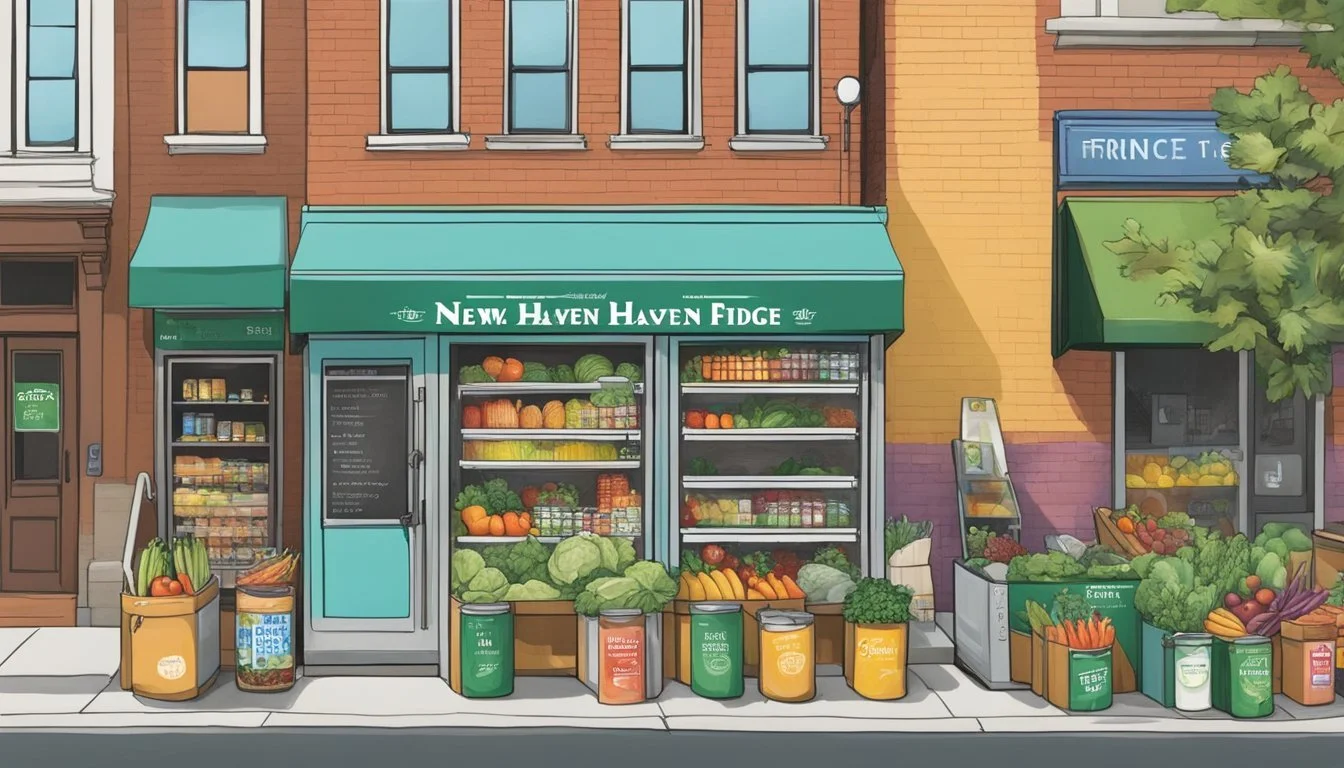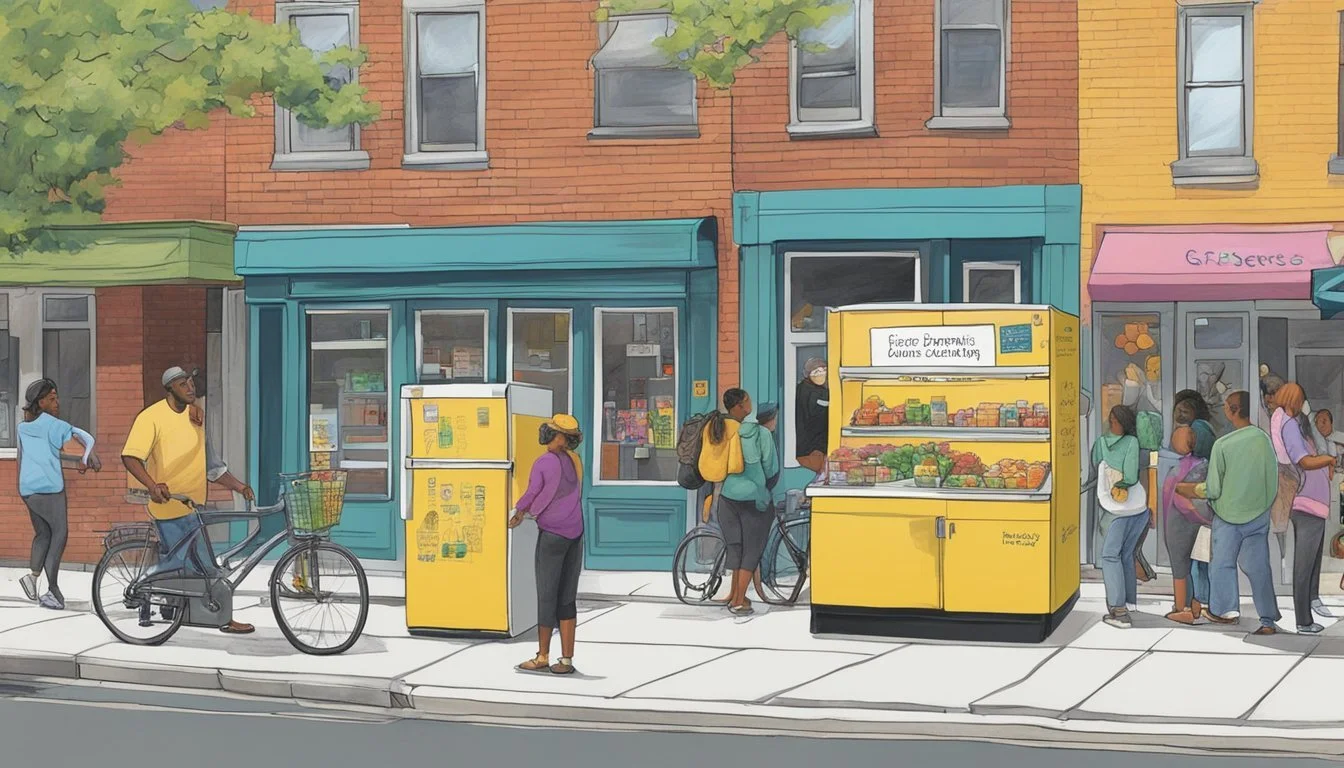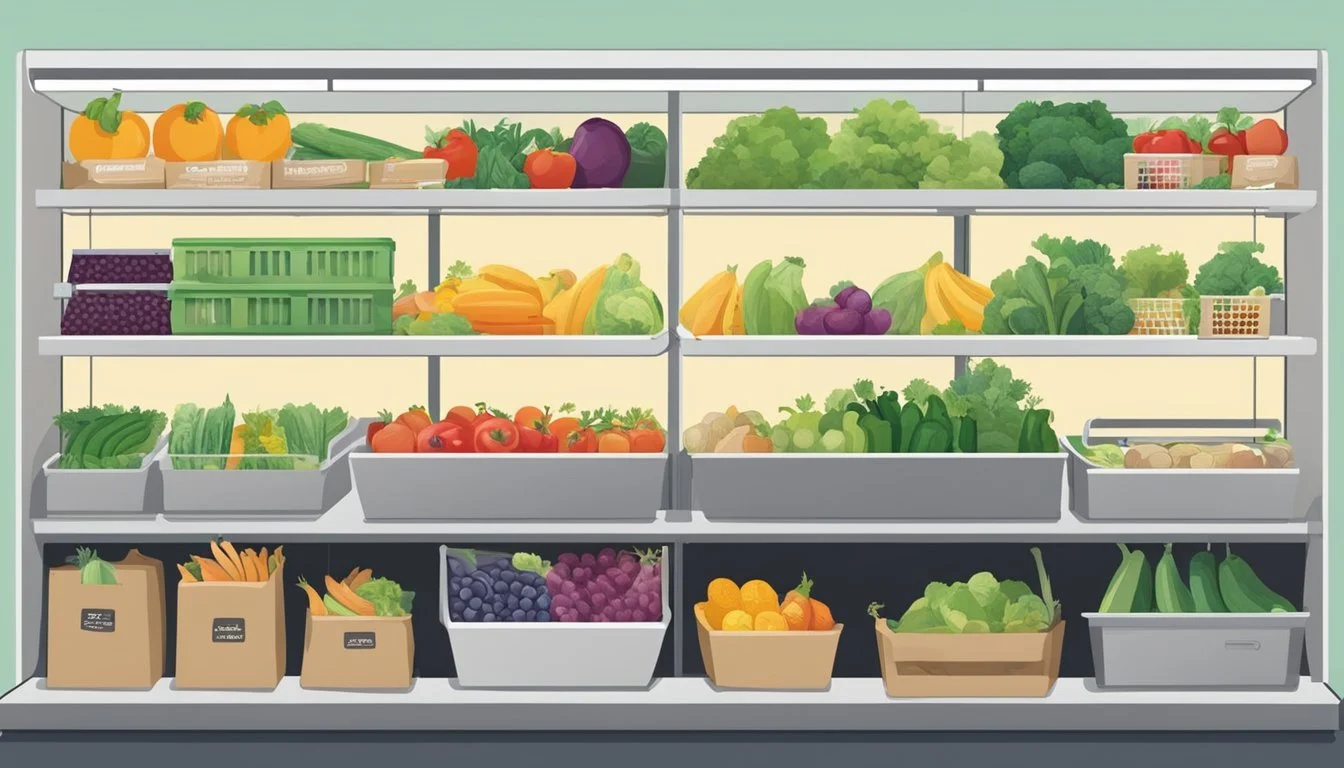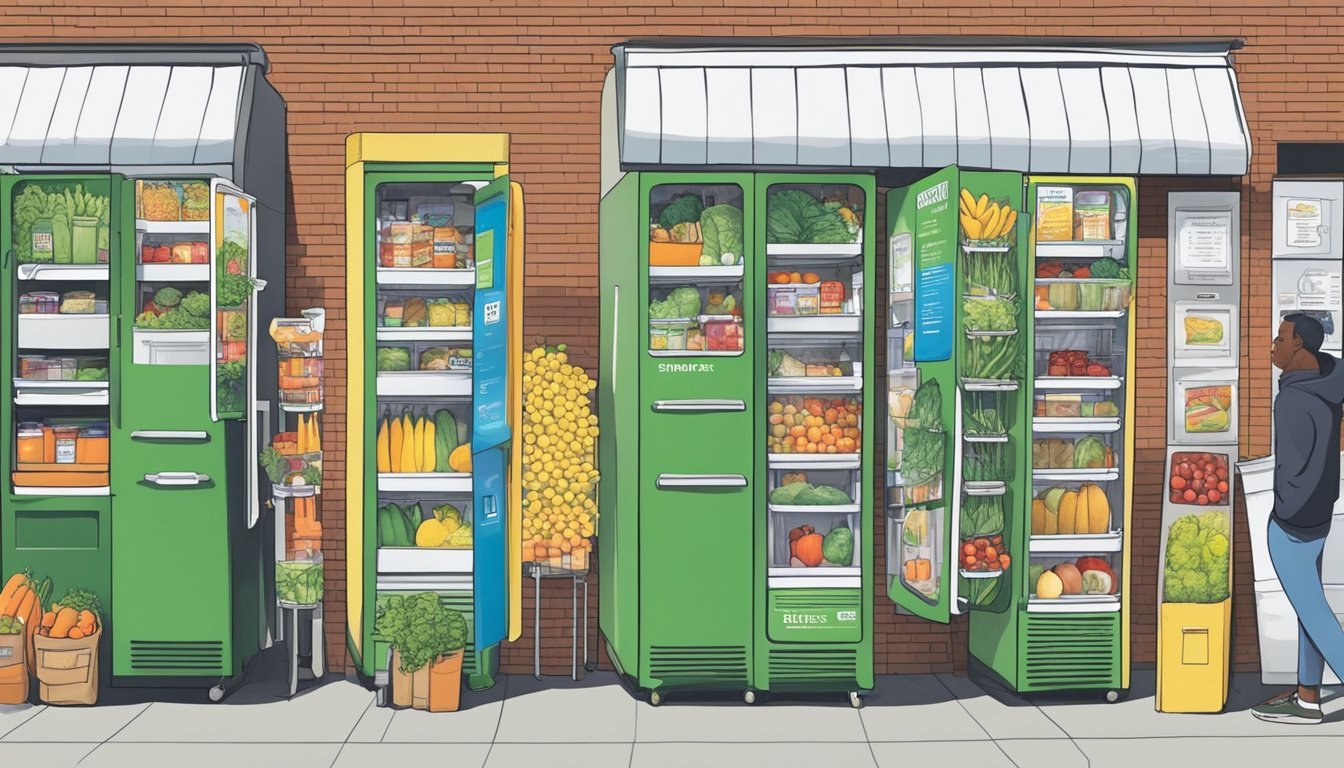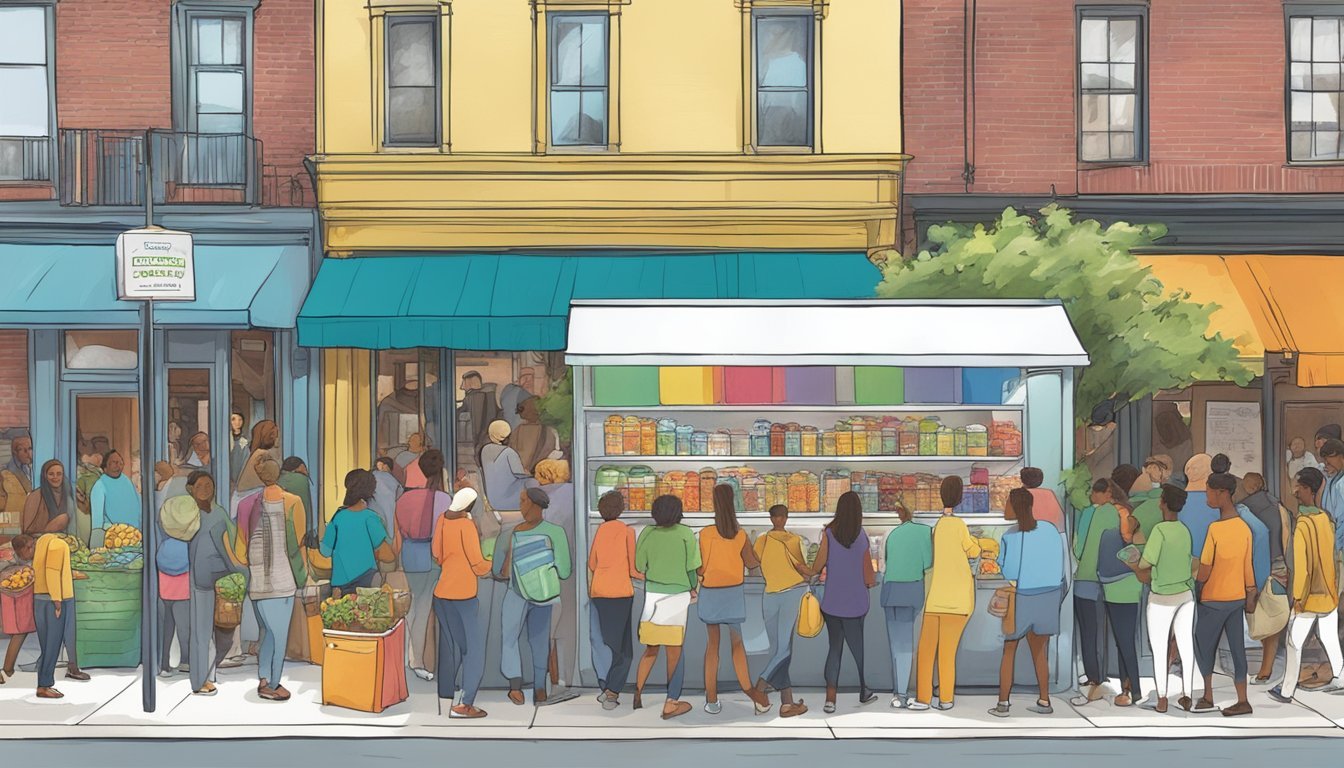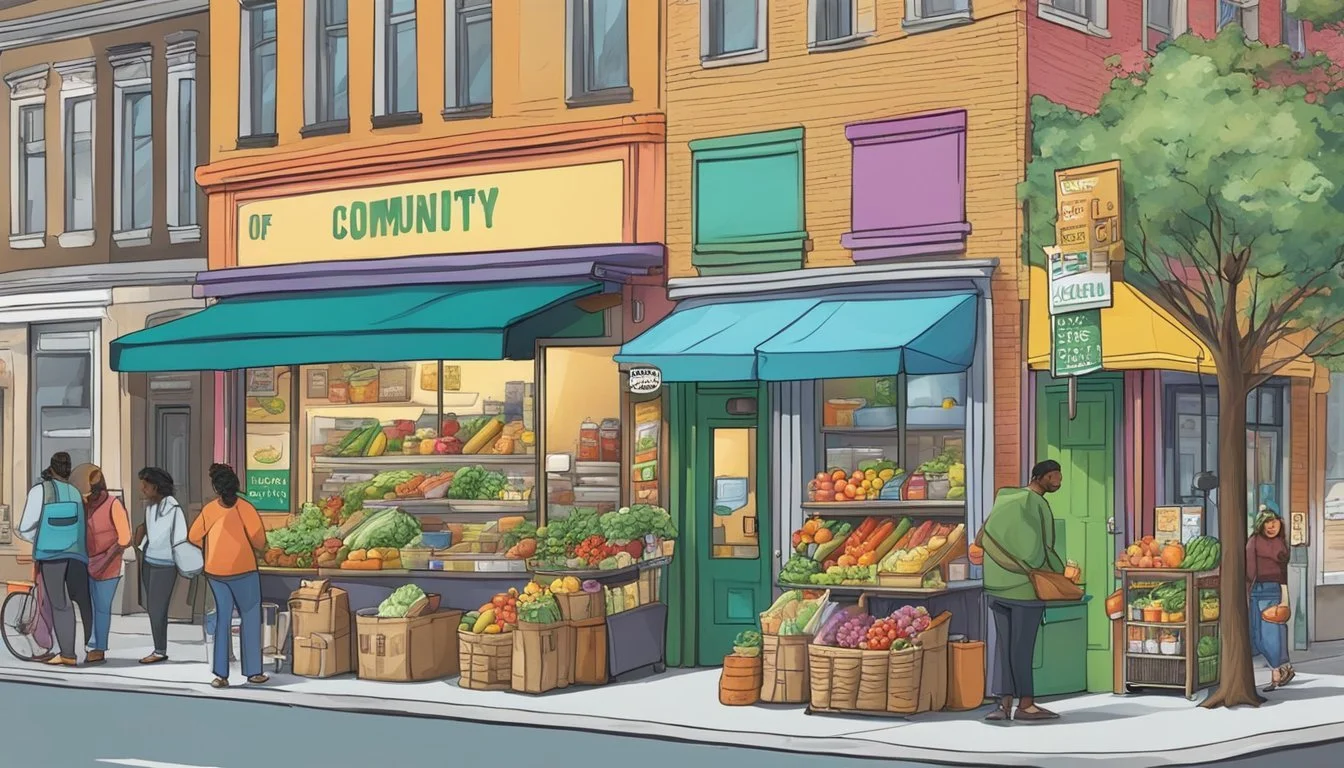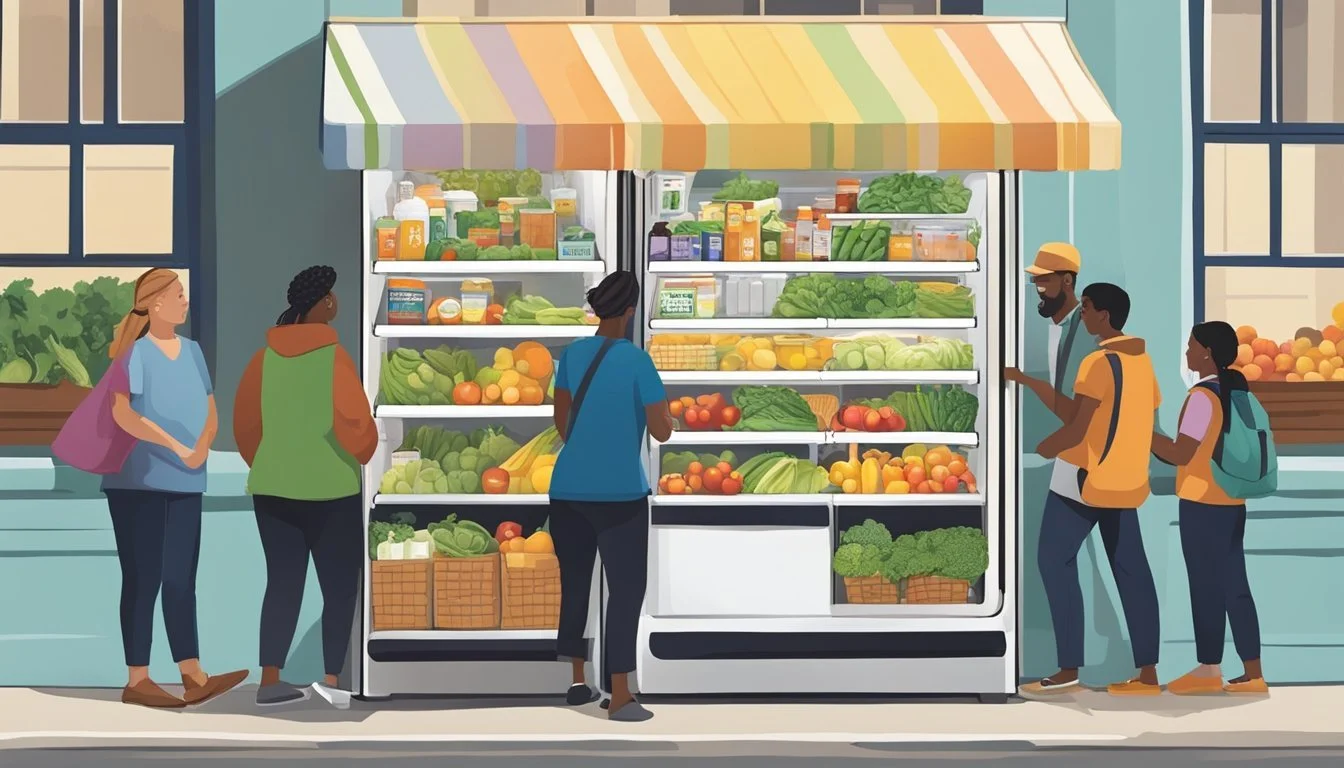New Haven, CT Community Fridge
Combatting Food Insecurity with Compassion
Community fridges in New Haven, Connecticut, have emerged as an innovative solution to the persistent issue of food insecurity. These public refrigerators provide no-cost, accessible food to those in need while also fostering a sense of community through shared resources. Situated in various locations throughout the city, the community fridges operate on a simple principle: "Take what you need, leave what you can," encouraging residents to contribute surplus food and ensuring that everyone has access to fresh produce and other staple foods.
The struggle against food insecurity in New Haven is a crucial one, affecting a significant portion of the population. Community fridges, such as Fridge Haven, aim to alleviate this problem by offering a 24/7 resource where individuals and families can find nourishing food without the barriers often associated with traditional food pantries. Such initiatives not only combat hunger but also help reduce food waste, as they provide a platform for donating excess food that would otherwise go unused.
Notable for their community-driven approach, these fridges are stocked by local residents, businesses, and organizations, cultivating an environment of mutual aid and support. The initiative builds on the concept of shared responsibility and collective action to create a more food-secure community. New Haven's embrace of community fridges reflects a growing movement to address food insecurity directly at the neighborhood level, ensuring that the right to food is met with both dignity and convenience.
History and Purpose of Community Fridges
Community fridges in New Haven represent a local solution to food insecurity, aligning with the global movement of providing mutual aid through shared resources.
Early Beginnings in New Haven
New Haven, CT, witnessed the installation of its first community fridges as a direct response to rising food insecurity issues. These fridges were set up to provide accessible food options to individuals and families in need. Specifically, Dixwell became a key location for one of these refrigerators, placed strategically to maximize community access.
Goals of the Community Fridge Movement
The underlying goal of the community fridge initiative is to facilitate a mutual aid network where residents can share perishable and non-perishable food items. This system operates on the principle of taking what one needs and leaving what one can, thereby fostering a sense of community while directly addressing hunger. The fridges are intended to be available to the public at all hours, ensuring that residents have a constant source of free and accessible nourishment.
Locations and Accessibility
Community fridges in New Haven are accessible resources for residents to address food insecurity. These fridges offer a range of food items and are strategically placed for easy community access.
Varick Memorial on Dixwell Ave
Fridge Haven is situated next to Varick Memorial A.M.E. Zion Church on 242 Dixwell Avenue. The fridge stands out as it not only supplies food, but also other essentials like diapers and personal protective equipment. Updates about current available supplies are regularly posted to their Instagram, ensuring the information on stock is transparent and current.
Other Notable Fridge Sites
Another prominent community fridge location is at the New Haven YMCA Youth Center on 50 Howe Street. Under their motto, "take what you need, leave what you can,” it accepts various donations including fresh produce and prepackaged meals.
Additionally, for residents closer to 219 James Street, they have the option to access another community fridge that serves the local population, embracing the concept of sharing and caring within the community around the clock.
All these fridges operate with the guiding principle of being open 24 hours, making them an integral part of the New Haven community, ensuring that no one has to go without regardless of the time of day.
How the Community Fridge Works
The Community Fridge in New Haven, CT operates as a hub for free food distribution, aiming to address food insecurity by enabling residents to both donate and collect foods. This self-sustaining system relies heavily on the participation and goodwill of community members.
Donation Process
Individuals and businesses can donate a variety of items to the community fridge, including perishable items like fresh produce and non-perishables. Donations must be safe for consumption and are typically made directly to the fridge location. It is preferred that the produce and other items are of good quality to ensure the well-being of all community members who access the fridge.
What can be donated:
Fresh produce
Non-perishable goods
Food Collection and Distribution
Community members in need can collect food from the fridge 24/7, with the caveat to take what you need, leave what you can to ensure that there is always something for everyone. The fridge operates on a trust basis, without any formal check-ins or questions asked, to maintain dignity and ease of access for all.
Access details:
Location: In a green shed in the parking lot at 242 Dixwell Ave, Varick Memorial Church
Hours: Open 24/7
Maintenance and Upkeep
Volunteers are the backbone of the fridge’s upkeep, ensuring that the space remains clean, organized, and well-stocked. The fridge requires continuous electricity to function, and corresponding costs are covered through donations or fundraisers. The community's involvement is critical in keeping the operation sustainable over time.
Volunteer responsibilities:
Regular cleaning
Organization of food items
Monitoring for food safety
Participation and Support
New Haven's Community Fridge initiatives thrive on a robust network of contributions and hands-on assistance from local residents, businesses, and organizations. This support manifests in various forms, from food donations and volunteer efforts to partnerships that bolster the project's reach and sustainability.
Individual and Restaurant Donors
Individuals and restaurants in New Haven play a critical role by donating food to community fridges. These contributors supply a variety of nourishment options, ranging from fresh produce to prepackaged meals. The "take what you need, leave what you can" philosophy encourages neighbors to contribute, ensuring a continuously replenished supply.
Key donations include:
Fresh produce
Prepackaged, prepared meals
Dairy products
Non-perishable items
Snacks
Community Volunteering
Volunteers are the backbone of the community fridge effort. They handle a spectrum of tasks like sorting donations, maintaining cleanliness, and ensuring the fridge is stocked. Food Pantry organizations often align with these grassroots efforts, providing additional support and resources.
Volunteer activities involve:
Sorting and stocking the fridge
Cleaning and organizing
Coordination with food pantries
Partnerships with Local Farms and Businesses
Local farms and businesses have established partnerships with community fridge projects, infusing the initiative with a consistent stream of fresh, locally sourced products. These collaborations not only contribute to food security but also create a strong community network combating food apartheid.
Partnership contributions feature:
Surplus produce from farms
Overstock items from local businesses
Financial or material support from various partners
Through these combined efforts, the community fridge initiative in New Haven effectively addresses food insecurity and fosters a culture of sharing and support.
Tackling Food Insecurity
In New Haven, Connecticut, community-led refrigerators have become a pivotal resource for locals facing food insecurity, providing 24/7 access to nutritious food at no cost. These initiatives not only support individuals in immediate need but also foster a spirit of communal support and engagement.
Impact on Local Communities
Community fridges, like Fridge Haven, strategically located in easily accessible areas, are combating food insecurity on a local scale. They operate on the simple principle: take what you need, leave what you can. By allowing locals to access food staples and fresh produce without cost, these fridges relieve the anxiety associated with not having enough to eat. The initiative empowers residents by ensuring all community members, especially those who are economically disadvantaged, have access to essential nutrition.
Educational Initiatives
These programs go beyond just providing meals; they are a hub for education on nutrition and food sustainability. By engaging with the community, including students, these fridges become a tool for raising awareness about food insecurity and how to combat it. Educational resources are often provided to encourage the public to make informed choices about their diets and the importance of contributing to and maintaining these community food pantries. Through this educational outreach, the community is informed not only about the availability of the resources but also about the importance of nutrition and food support networks.
Sustainability and Community Impact
Community fridges in New Haven, specifically initiatives like Fridge Haven and Fridgeport, aim to address food insecurity while simultaneously promoting sustainability through the reduction of food waste and the provision of nutritious food.
Reducing Food Waste
Community refrigerators, such as Fridgeport located at 219 James Street, Bridgeport, CT, provide a platform for food sharing that diverts edible items from landfills. These fridges are accessible 24/7, facilitating the donation of surplus food which would otherwise be wasted. This model not only contributes to waste reduction but also to a more affordable and circular food system. Organizations involved, like Kingdom Builders Impact Ministries, play a pivotal role in sustaining these efforts by accepting and overseeing donations.
Nutrition and Health Benefits
The availability of community fridges ensures that nutritious food is accessible to all, including those who might struggle to afford groceries. By supplying a range of items, from meat to vegan alternatives and fresh produce, these fridges not only combat hunger but also foster healthier communities. Regular consumption of a balanced diet, thanks to the varied offerings of community fridges, can lead to long-term positive outcomes in community health and well-being.
Challenges and Solutions
The establishment and maintenance of community fridges, like those in New Haven, CT, present unique challenges but also yield impactful solutions. These challenges primarily revolve around logistical hurdles and compliance with safety and health regulations.
Logistical Hurdles
Community fridge projects require a strategic approach to ensure that the refrigerators are located where they are most needed and that their stocking and maintenance are managed effectively. In New Haven, the Fridge Haven initiative has strategically placed their fridge at 242 Dixwell Avenue, an accessible location for those in need. Reggy Saint FortColin has experienced food insecurity firsthand and recognizes the importance of these efforts. The pandemic has only exacerbated the need for such community-support systems. These fridges offer perishable food, often necessitating a steady rotation of items to avoid waste and ensure freshness.
Location: Accessible site selection in food-insecure areas.
Stocking: Regularly replenished with donations.
Management: Schedule coordination for volunteers to maintain fridge cleanliness and organization.
Safety and Health Regulations
Safety and health are paramount in the operation of community fridges. These fridges must adhere to local health codes to ensure that the distributed food is safe to consume. They operate on the principles of trust and community responsibility, with all food being offered freely and without restriction. Monitoring is necessary to maintain food quality and safe temperatures, and to ensure that donated items are stored according to health guidelines.
Food Quality: Ensuring the provision of fresh, healthy options.
Temperature Monitoring: Regular checks to keep food within safe consumption ranges.
Health Compliance: Strict adherence to local health codes and regulations for food distribution.
Success Stories and Testimonials
In New Haven, Connecticut, community fridges like Fridge Haven and Fridgeford have become beacons of hope amidst the food insecurity crisis. They offer free access to food and essential supplies, creating a strong sense of community support.
Beneficiary Experiences
Fridge Haven, located next to the Varick Memorial A.M.E. Zion Church, is not just a source of sustenance; it has become a symbol of care in the community. Residents such as Aida Rivera have expressed gratitude for the support the fridge community has provided. Rivera underscored how Fridge Haven helped her stretch her limited budget and provided her family with fresh produce, a luxury they otherwise often had to forgo.
Dwight Community Fridge and the community fridge at the New Haven YMCA also share similar success stories. Beneficiaries often highlight:
The generous, consistent stock of healthy food options.
The non-judgmental, welcoming environment where everyone is encouraged to take what they need.
Life stories about overcoming hunger thanks to the reliable presence of the fridge.
Volunteer Narratives
Volunteers are the backbone of these initiatives. At Fridge Haven, there's a shared sentiment that their contribution goes beyond just stocking a fridge—they're nurturing their neighbors. One volunteer mentioned, "Seeing faces light up when the fridge is replenished fills me with immense satisfaction. It's about spreading hope."
The story of Fridgeford resonates with unity and community resilience. Volunteers there take pride in the collective effort, reinforcing that the success belongs not to an individual but to everyone involved. Key volunteer insights include:
The joy of seeing people come together for a common cause of alleviating hunger.
Personal growth through the selfless act of helping those in need.
Connections made with community members they might not have met otherwise.
How to Get Involved
Community involvement is the backbone of New Haven's Community Fridge initiative. Anyone looking to contribute can donate, volunteer their time, or help raise awareness to keep the program robust and accessible to all.
Making Donations
One can donate a variety of items to the community fridge, including fresh produce, prepackaged meals, dairy products, and non-perishables. Donations are the lifeline of the community fridge, ensuring that free food is available to those in need. Individuals interested in donating can drop off acceptable items directly at the community fridge locations. Food businesses and local farms are also encouraged to contribute surplus goods. To find the nearest fridge, or to learn more about what items are most needed, visiting the Instagram page of local community fridge organizations, such as Fridge Haven, can provide up-to-date information and a real sense of the community spirit.
Volunteer Opportunities
Volunteers play an essential role in maintaining the operation and cleanliness of the fridges. There are many ways to volunteer, from monitoring the fridges to ensure they are clean and stocked, to assisting with transportation and logistics. For those with a knack for organization, opportunities exist to coordinate food drives or manage donation schedules. Local organizations like Bridgeport Mutual Aid can be contacted directly to discover the numerous ways to lend a hand. Involvement in community events and educational workshops is another facet of volunteering, allowing individuals to directly contribute to eradicating food insecurity in their community.
Raising Awareness
Raising awareness is critical in sustaining the community fridge effort. It involves sharing information, engaging through social media, and informing others about the resource available in the community. Educating the public on the statistics regarding hunger and food insecurity, possibly with data provided by resources like DataHaven, can help galvanize support. Community members are encouraged to follow and contribute to the conversation on social media platforms, particularly Instagram, where they can repost information, share stories of impact, and invite their networks to participate. Visibility is key, and a well-informed community is more likely to rally around and support its local fridge.
Future Directions and Expansion Plans
The growth trajectory of New Haven's Community Fridge initiative seeks to strengthen the local food support system and promote mutual aid with an emphasis on sustainability.
Looking Ahead
New Haven's Community Fridge project is poised for future growth, with plans to address the ongoing challenges of food insecurity through expanding its reach in the community. The initiative's blueprint includes identifying new locations that can support additional fridges. They aim to collaborate with local businesses and organizations to ensure consistent food availability and to foster a system of mutual support.
Community Fridge Replication
The success of the Community Fridge in New Haven serves as a model for neighboring communities. The organizers are developing a replication strategy to guide other groups interested in establishing their own community fridges. This includes sharing best practices on maintaining food safety, ensuring a steady supply chain, and engaging the community effectively in the mutual aid network. The ultimate goal is to create a cohesive network of community fridges that can provide reliable access to food for those in need.

